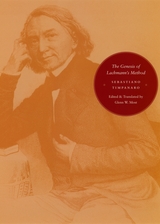2 books about German philology

The Genesis of Lachmann's Method
Sebastiano Timpanaro
University of Chicago Press, 2005
Until the modern period, the reproduction of written texts required manual transcription from earlier versions. This cumbersome process inevitably created errors and made it increasingly difficult to identify the original readings among multiple copies. Lachmann's method—associated with German classicist Karl Lachmann (1793-1851)—aimed to provide scholars with a scientific, systematic procedure to standardize the transmission of ancient texts. Although these guidelines for analysis were frequently challenged, they retained a paradigmatic value in philology for many years. In 1963, Italian philologist Sebastiano Timpanaro became the first to analyze in depth the history and limits of Lachmann's widely established theory with his publication, La genesi del metodo del Lachmann.
This important work, which brought Timpanaro international repute, now appears in its first English translation. The Genesis of Lachmann's Method examines the origin, development, and validity of Lachmann's model as well as its association with Lachmann himself. It remains a fundamental work on the history and methods of philology, and Glenn W. Most's translation makes this seminal study available to an English-speaking audience. Revealing Timpanaro's extraordinary talent as a textual critic and world-class scholar, this book will be indispensable to classicists, textual critics, biblical scholars, historians of science, and literary theorists.
This important work, which brought Timpanaro international repute, now appears in its first English translation. The Genesis of Lachmann's Method examines the origin, development, and validity of Lachmann's model as well as its association with Lachmann himself. It remains a fundamental work on the history and methods of philology, and Glenn W. Most's translation makes this seminal study available to an English-speaking audience. Revealing Timpanaro's extraordinary talent as a textual critic and world-class scholar, this book will be indispensable to classicists, textual critics, biblical scholars, historians of science, and literary theorists.
[more]

Glanz und Abglanz
Two Centuries of German Studies in the University of London
Edited by John L. Flood and Anne Simon
University of London Press, 2017
In 1943, in the midst of a London still reeling from the Blitz, initial plans were laid for an Institute devoted to rebuilding relations between English and German scholars and academics once hostilities had ceased. Established in 1950, the Institute served for more than half a century as a research centre and focal point for researchers the world over. However, German Studies in London have a much older tradition which goes back almost two centuries. Glanz und Abglanz tells the fascinating tale of German Studies in London from its beginnings at the ‘godless institution of Gower Street’, and the remarkable personalities whose energy and commitment ensured that the discipline flourished. The story is told through two essays: ‘Taught by Giants’ outlining the history of the subject in London from 1826, and ‘“Sehr schön, Piglet?” “Ja, Pooh.”’ following the development of the Institute of Germanic Languages and Literatures and showcasing its remarkable library. The volume is rounded off with an account of the magnificent collection of rare books assembled by two of the personalities, Robert Priebsch (1866–1935) and August Closs (1898–1990). John L. Flood has been associated with the University of London for more than fifty years, having taught German at King’s College from 1965 until 1979, when he was appointed Deputy Director of the Institute of Germanic Studies. Since his retirement in 2002, Professor Flood has been an Honorary Fellow of the Institute. Anne Simon took her PhD at the University of London, then became Lecturer in Medieval German at the University of Bristol from 1992 to 2011. She held a temporary Lectureship at the Institute of Germanic & Romance Studies, London, in 2012–13, and is now an Associate Fellow of the Institute of Modern Languages Research.
[more]
READERS
Browse our collection.
PUBLISHERS
See BiblioVault's publisher services.
STUDENT SERVICES
Files for college accessibility offices.
UChicago Accessibility Resources
home | accessibility | search | about | contact us
BiblioVault ® 2001 - 2024
The University of Chicago Press









